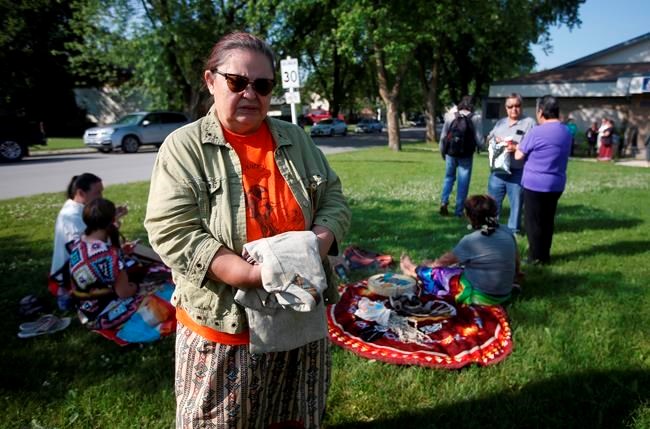POWERVIEW, Man. — A First Nations woman says she is disappointed a 92-year-old priest accused of assaulting her when she was a student at a former residential school did not attend his first court appearance.
"What a coward," said Victoria McIntosh, 63, outside a legion hall where court was held in Powerview-Pine Falls, north of Winnipeg, on Wednesday.Â
"I don't care how old you are. You could have made it here if you wanted to."
Arthur Masse faces one count of indecent assault from when the woman was 10 and attended the Fort Alexander Residential School in Manitoba.
His lawyer appeared in court on his behalf, which is not uncommon for a first appearance, and the Crown said the priest's age was a factor. A next court date was set for Aug. 17.Â
McIntosh said she had hoped Masse would be there so she could face him for the first time in more than 50 years.Â
The Canadian Press doesn't typically name complainants in such cases, but McIntosh said she wants to speak publicly and no publication ban was ordered.
In court, she held onto a sweater she wore as a child and sat beside her young grandson. She said when she started school for the first time, a nun took her clothing and called her a savage.
McIntosh said speaking out about her experience at the school was one of the most difficult things she's done, but she feels like she's finally been heard. She wanted to honour her mother and grandfather, who were also residential school survivors. They were unable to get justice before they died, she added.
Before the court appearance, McIntosh stood outside with several other people, while there was drumming, singing and smudging.
There is no time limit for grieving the loss of a childhood, she said.
"I carried this for a long time," she said. "I was a 10-year-old child."
McIntosh said she has awful memories of the school. She didn't celebrate birthdays or Christmas at the institution. She was denigrated and made to feel ashamed of being Anishinaabe.Â
Later, she became a teacher and saw herself in the innocent children she taught.
RCMP have said the alleged offence took place between 1968 and 1970 when Masse was employed at the Fort Alexander Residential School.
The school opened in 1905 in the community of Fort Alexander, which later became Sagkeeng First Nation. It closed in 1970.
RCMP said they were notified of allegations of sexual abuse at the school in 2010.
Throughout the investigation, officers interacted with more than 700 people across North America and obtained 75 victim and witness statements. More than 80 investigators were involved.
McIntosh said she would be interested in participating in a sentencing circle as an option for the court.
That's something that could benefit other members of the community who were impacted by the school, said Marilyn Courchene, who also attended Fort Alexander while Masse worked there.Â
McIntosh and Courchene said they plan to travel over the weekend to Alberta, where Pope Francis is to start is first visit to Canada. He is also expected to apologize for the Roman Catholic Church's role in residential schools during the trip.Â
An estimated 150,000 Indigenous children were forced to attend residential schools over a century, and the Roman Catholic Church ran about 60 per cent of the institutions.
Courchene said she hopes they have an opportunity to speak to Francis about the court case.
"He needs to hear from us," she said.
Sagkeeng First Nation Chief Derrick Henderson said Wednesday's court appearance was an important step for the community, which has been grieving following the recent discovery of 190 anomalies during its search for unmarked graves near the school using ground-penetrating radar.Â
Many people feel like they are finally being believed, he added.
"This is going to open other people’s eyes."Â
The Indian Residential Schools Resolution Health Support Program has a hotline to help residential school survivors and their relatives suffering trauma invoked by the recall of past abuse. The number is 1-866-925-4419.
This report by The Canadian Press was first published July 20, 2022.Â
Kelly Geraldine Malone, The Canadian Press



